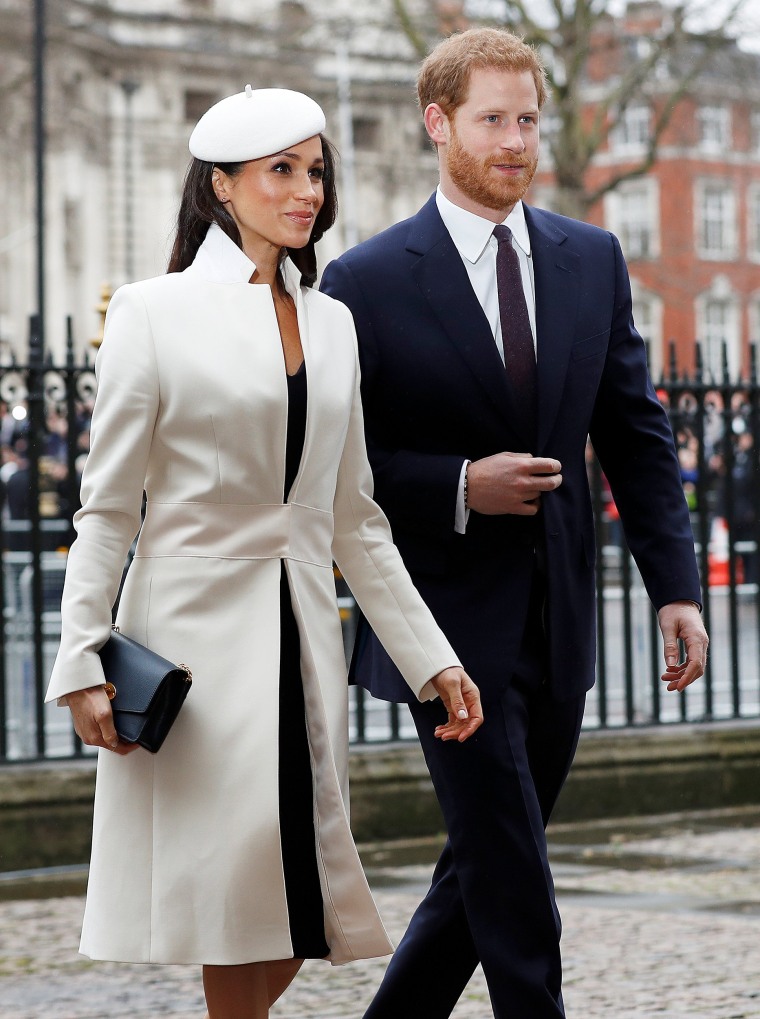After months of successfully avoiding all that is the forthcoming wedding of former “Suits” actress Meghan Markle and Britain’s Prince Harry, I finally succumbed in the last week as my social media was besieged with headlines about Markle’s dad and whether or not he would be attending his daughter’s nuptials. Her dad was coming and then not coming and then coming again? He staged paparazzi photos of himself? Her half-sister planned the whole thing? He had a heart attack that seems inevitably tied to the stress of all of it? And have the Queen’s corgis weighed in?

There’s something about the promise of family drama that lured me into engagement despite my best intentions because, suddenly, this couple who seemed alien to me as a result of the status bequeathed by royalty, celebrity and good looks seemed eminently relatable. After all, everyone has some complicated family dynamics. Stars: They really are just like us.
Now I see Harry and Meghan (with whom I now feel intimately acquainted after a deep-dive on the latter’s father’s cardiovascular health, his period of estrangement from his daughter, their possible Jewishness and catching a few minutes of “Harry & Meghan: A Royal Romance” on Lifetime on Sunday evening) as shining beacons of hope for all of us who, in some way, have been touched by the wedding industrial complex and the way it attempts to scare us all into believing that unless everything at your wedding is “perfect,” your marriage might as well not even happen.
Stars: They really are just like us.
And, as the heavily, dramatically scored “Harry & Meghan” taught me, these two are really, genuinely in love and have managed to make things work despite endless rounds of messy families being messy, a racist tabloid press being racist, and the general unyielding gaze of a modern world forever watching and demanding perfection from people who just happen to have access to crowns by fluke of birth.
That is why I think the public is so obsessively thirsty for these two to make it work. (I mean, Will Ferrell didn’t do an HBO special just when Prince William got married, now did he?) The marriage of the actress and the prince isn’t enchanting because of all the glamour around it, but because in some ways, their lives feel too familiar. Their story is laced throughout with the kind of low-key exhausting daily grind of dealing with your crazy family and choosing to love someone and engage in the grand experiment of marriage despite everything.
The couple is the living, breathing embodiment of something one of my best friends recently told me was the best advice I had ever given her, now almost a decade ago during her own wedding planning process. “You told me that no one would be sitting at my wedding and looking at each other, whispering, ‘Hmm, these are her second choice flowers,'” my friend shared with me just this week.
None of the stuff of the wedding actually matters — even when that stuff takes the form of the tricky emotional landmines of which relatives are presently speaking to each other or to you.
Because despite the clucking tongue of an aunt who has something to say about your choice of canapés or a cousin whispering not-so-quietly about the absence of Chivari chairs, none of this —and of course we all know this, somewhere deep down inside of us — actually matters.
The florist who wouldn’t do your bouquet for less than several years’ worth of mortgage payments? Who cares. The strings ensemble who wouldn’t serenade you down the aisle unless you paid for massages for them all on top of their booking fee? Forget them. The cake artisan didn’t roll (or deliver cakes) on the Shabbas? There are plenty of kosher non-Jewish bakers who would be happy to oblige.
None of the stuff of the wedding actually matters — even when that stuff takes the form of the tricky emotional landmines of which relatives are presently speaking to each other or to you. A wedding can so often feel like a service performed for others, a simple opportunity to perform a ritual so that others may partake and feel loved and cherished and cared for and celebrated. And so it goes to follow that you would want such a ritual performed for the service of others to be executed flawlessly.
How beautiful, stunning, shocking and profound that despite all this, couples continue to have the chance to choose one another.
But life is messier than that. So the second-choice flowers will do; no one will be any wiser. And a relative may come or not come or try to pick a fight with anyone who will have one. But none of that is a projection or prediction of a couple’s future outcome, anymore than which stems make it into the table arrangements. Weddings become emotionally fraught, and family ties are or become emotionally fraught — but how beautiful, stunning, shocking and profound that despite all this, couples continue to have the chance to choose one another, and do so not simply in spite of the noise, but while holding it close themselves.
A marriage, hopefully, isn’t in fact about the pomp and circumstance (or the second-choice flowers). It’s about people choosing to do the work of choosing each other, and helping shoulder each other’s load, family drama and all.
And if Harry and Meghan can do it, well then maybe there’s hope for the rest of us.
Jennifer Gerson is an Atlanta-based writer and reporter whose work has appeared in Cosmopolitan, Glamour, Teen Vogue, Yahoo, The Guardian and Mic. She is a 2015 Maggie Award recipient for her reporting work on topics surrounding reproductive health and reproductive justice.
